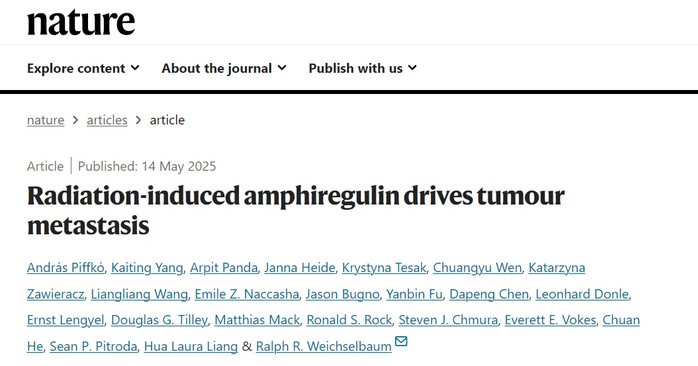In the ongoing battle against cancer, radiation therapy has long been a cornerstone treatment modality. A significant breakthrough has now been achieved by Professor YangKaiting fromSchool of Biomedical Science and Engineering, in collaboration with scientists from the University of Chicago. Their landmark study, entitled 'Radiation-induced amphiregulin drives tumour metastasis,' has been published in the prestigious journal Nature, uncovering previously unknown 'abscopal adverse effects' of cancerradiotherapy.

Radiation Therapy: A Double-Edged Sword in Cancer Treatment
Radiation therapy has long been recognized as a dual-faceted weapon in oncology. Early studies demonstrated that while it can suppress the growth of localized tumors, it also triggers a systemic immune response—leading to the well-documented 'abscopal effect,' where distant, non-irradiated tumors regress. However, paradoxically, radiation therapy may also promote tumor metastasis in untreated areas, a phenomenon the research team terms the 'badscopal effect.'
In their study, the team reveals that high-dose radiation induces tumor cells at the treatment site to produce amphiregulin (AREG), a key protein implicated in this adverse process. Elevated AREG levels not only fuel the proliferation of primary tumors but also enhance the metastatic potential of cancer cells, ultimately driving the growth of secondary tumors in unirradiated regions.
Blockade of AREG Significantly Inhibits Tumor Metastasis
The research team uncovered the molecular mechanism bywhich amphiregulin (AREG) promotes tumor progression. They found that AREG activates the epidermal growth factor receptor (EGFR) signaling pathway, impairing the body’s immune surveillance against tumors. Additionally, AREG secretion upregulates CD47—a key 'don’t eat me' signal on tumor cells—thereby reducing macrophage-mediated phagocytosis and immune clearance.
Crucially, the team demonstrated that combining AREG blockade with radiotherapy significantly reduced both primary tumor size and metastatic burden. This discovery provides a theoretical foundation for improving metastatic cancer treatment through precision interventions.
Beyond mechanistic insights, these findings have critical clinical implications. Future applications may include monitoring radiotherapy-induced AREG levels to predict and counteract potential 'badscopal effects' before they occur. Such strategies could pave the way for personalized radiotherapy regimens, revitalizing this cornerstone cancer treatment with enhanced precision and efficacy.





